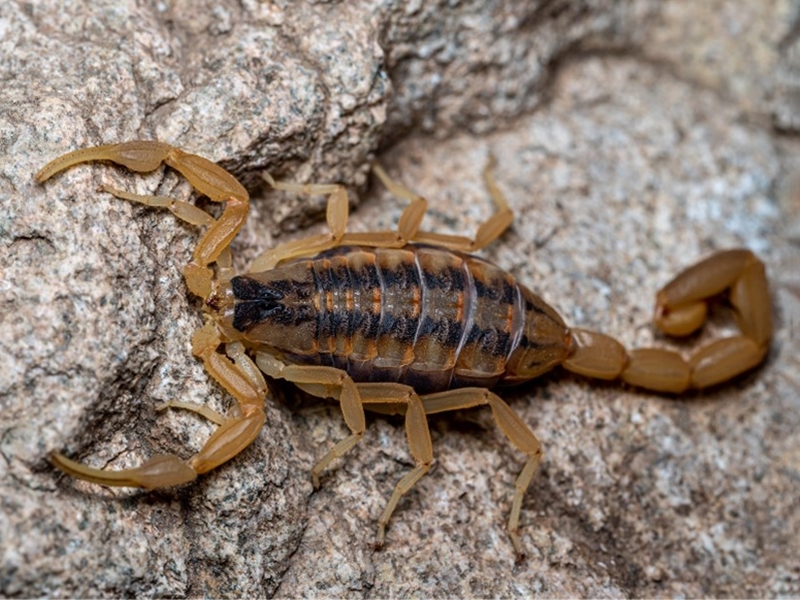Scientists at Arkansas Tech University and University of Arkansas have produced a high-quality genome assembly for a scorpion. The genome could lead to the development of new medically relevant pain treatments.
Tsunemi Yamashita, biology professor at Arkansas Tech University, worked with students and University of Arkansas researchers Douglas Rhoads, Jeff Pummill and Suresh Thallapuranam to expand his project working on scorpions commonly found throughout Arkansas.
In addition to the discovery of a new species of mycoplasma infesting the scorpions, the work showed that genes for the toxins are not only turned on in the telson (where the stinger is), but also at far lower levels in the rest of the body. Further, the toxin genes are arrayed in clusters showing gene duplication and diversification that is driving the evolution of new toxin proteins. Toxins produced by scorpions, spiders and snakes are mixtures of multiple different toxin proteins with different biological activities for prey, or defenses.
This is the fifth publication coming out of this collaboration which began in 2003 and has been funded by AR-INBRE. The first publication was on molecular biogeography of this scorpion species. Followed by publications on a Mycoplasma infesting these scorpions, the mitochondrial genome of the scorpion, proteome analysis of the toxins produced by the scorpion, and now the release of the annotated genome for C. vittatus, published in August in the journal G3 Genes|Genomes|Genetics.
"The striped bark scorpion, Centruroides vittatus, is of interest as it is the only scorpion that inhabits the Midwest, ranging into Arkansas, Missouri, Illinois, Louisiana, with potentially human transported populations established outside their known geographic range across the Mississippi River into areas such as middle Tennessee," said Yamashita. "As such, it exhibits an interesting evolutionary history of range expansion. Also, it is a species in the medically important Buthid scorpion family, which causes human fatalities and toxic effects around the world, due to their venom constituents. However, the striped bark scorpion does not appear to cause marked medical effects in humans as other species of the Centruroides genus, thus its venom is of interest for medial analysis."
"The scorpion genome we have produced is one of the best from a group of organisms that gets less attention, but produces proteins that have biomedical importance for pain and pain relief," Rhoads said.
Yamashita is working with Thallapuranam to produce individual toxin proteins by expressing them in bacteria, to study the individual activities of the different toxin proteins.
Yamashita began his scorpion research as a Vanderbilt University graduate student under the direction of Gary Polis, a well-known scorpion ecologist. At Vanderbilt, Yamashita studied the population genetics of the sand scorpion, which inhabits the sand dunes and sandy regions of the Sonoran desert. He continued his scorpion research with investigations of the striped bark scorpion, Centruroides vittatus. This research activity currently focuses on the venom constituents of the striped scorpion through proteomic, transcriptomic, and genomic investigations.
Specimens were collected by Yamashita in Arkansas. DNA and RNA extraction was performed at the U of A by Yamashita and Rhoads. Sequencing was performed using facilities at Michigan State University, Mississippi State University and King Abdullah University of Science and Technology. The majority of the computer work was by Pummill to assemble the genome and transcriptome using resources at the Arkansas High Performance Computing Center. Additional genome annotation was by collaborators using computers at the Jackson Laboratories in Bar Harbor, Maine. Yamashita and Rhoads then performed analyses of venom genes and their expression patterns within scorpion tissues.
Rhoads and Pummill are now collaborating with Steven Beaupre of the U of A and Ryan Stork of Harding University on additional genomes from the Brown Recluse spider and Wolf spider, respectively. Comparison of the spider and scorpion genomes will help scientists better understand the patterns for evolution of toxin genes.
The Arkansas IDeA Network of Biomedical Research Excellence is funded by a grant from the National Institute of General Medical Sciences under the Institutional Development Award Program of the National Institutes of Health. The IDeA program was established for the purpose of broadening the geographic distribution of NIH funding for biomedical and behavioral research. Currently NIGMS supports INBRE programs in 23 states and Puerto Rico.
The Arkansas High Performance Computing Center collaborates with researchers across the state on access to high-performance computing for academic research.
Topics
Contacts
Douglas Rhoads , University Professor
Department of Biological Sciences
479-575-7396,
Matt McGowan, science and research communications officer
University Relations
479-575-4246,
